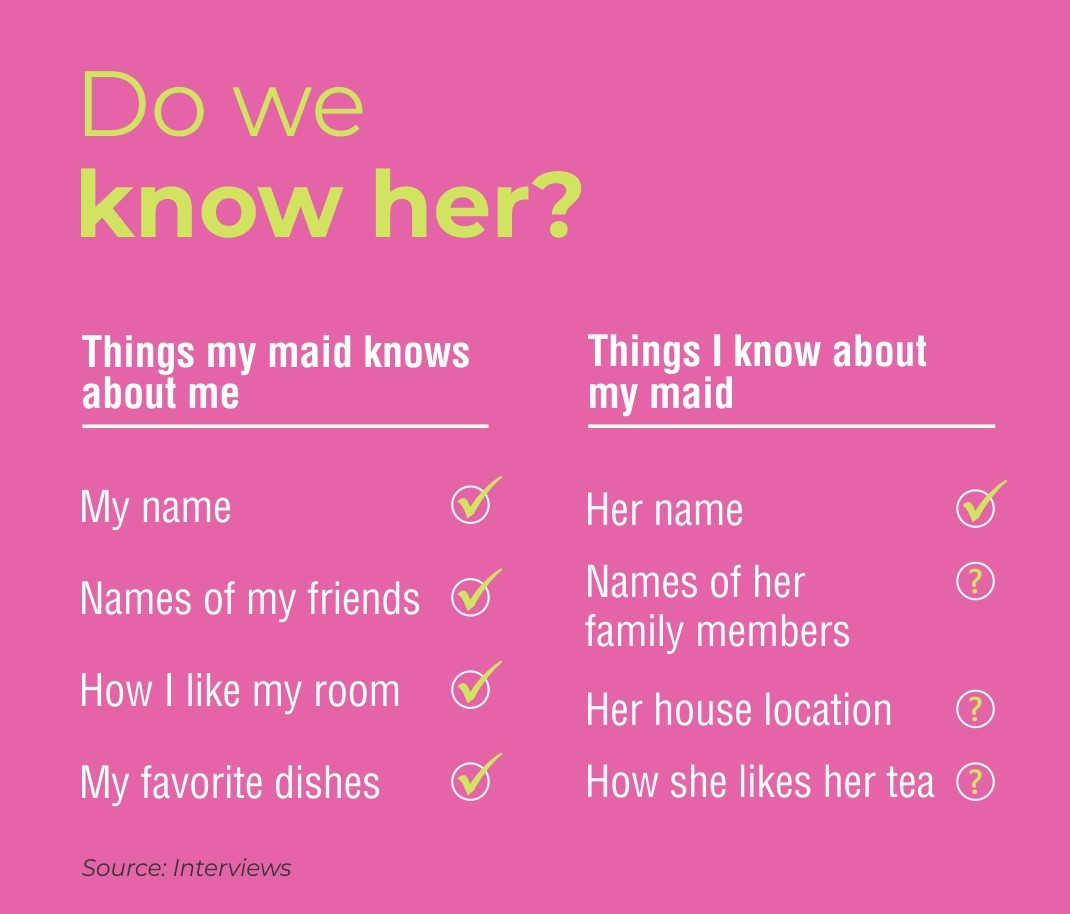July, 2020
A (long overdue) conversation with my domestic help.
4 minutes read
….was not something I ever thought I would do. Yet, only a few months back, I ended up doing exactly that. In fact, I interviewed 5 other domestic workers from different parts of the country in May 2020 as part of my internship with Women’s Identity and Progress.
I must say, initially I was pretty nervous about having hour-long conversations with domestic workers, even Parmita didi (name changed), who has been with my family for quite some time now. But, why? There really was no reason to be anxious or awkward, right? Suddenly (actually it was after 30 minutes of retrospection), the realization struck me.
Despite having “known” her for almost two years, I had never actually had a proper conversation with Parmita didi. Not once. The idiosyncrasy of the situation is astounding, isn’t it? I saw her almost everyday, and yet never truly recognised her as a part of my life. On one hand, she knows a great deal about me – everything from my food preferences to my annoying habits; on the other hand, I didn’t even know her last name.
Many say that their domestic workers are like their family, but then why does this one-sided intimacy exist? Truth be told, it’s as though our househelps are minor secondary characters in our lives. It’s shameful how seldom I have ever asked didi anything about hers. Then one day, I call her out of nowhere (it was a telephonic conversation because, you know, Covid-19), asking her about her work, her family, her past, her opinions, everything. Not because I wanted to, but because it was a part of my job.
So there I was, talking to a woman (a woman with whom my conversations before had barely consisted of more than five syllables) about how she dealt with work during her period and how her employers (my family included) treated her. She was perplexed the whole time. Not because she didn’t know the purpose of the interview but because one of her employers asking her about her life was unimaginable for her. But because me asking if she had a fridge at home was understandably absurd for her. I observed that all domestic workers I interviewed were careful while answering the questions so as to not jeopardize their jobs or security. I had to coax them and constantly rephrase my questions so as to get a clearer picture of their reality. Asking her to trust me enough to be able to talk about abusive/inconsiderate employers or traumatic experiences was hard for the both of us.

Furthermore, one thing that was blatantly visible to me was the power dynamic. They feel this “obvious” inferiority with their employers (or literally anyone who looks richer or more educated than them). Why does this hierarchy exist? Probably because most, if not all, domestic workers in India are at our mercy for their wages, paid leaves, loans, and other basic benefits and necessities. Technically, they are our service providers, but the essence of their profession is rooted in slavery. The casteist and classist nature of the industry has had a huge role in this.
Listening to Parmita didi was a humbling, and equally startling, experience. There was so much I didn’t know about her (it’s almost ludicrous) – she has been doing paid domestic work since she was thirteen years old (her father had died and her mother had fallen sick); her oldest daughter wants to become a civil servant; she bought herself her first phone last year with her savings (I’ll admit I felt a pang of shame at that moment as I looked at the iPhone in my hand); she also told me about her abusive husband.
It was hard for me to acknowledge that I had never made any efforts to make things easier for someone who has led (still leads) such a difficult life. By the end of the interview, I saw her in a completely different light (I know that sounds cliched, but it’s true). When you look at a person’s life from their perspective, it becomes so much easier to sympathize and also, empathize.
All of a sudden, she seemed more “human”, not like a supporting character in my life but instead an individual with their own identity, their own asha.
Now, I cannot ask you all to call up your housemaids and have a chat, but what you can do is check out The Blue Divide’s Uski Asha series in order to understand the lives of our indispensable service providers (domestic workers, waste and sanitation workers, street vendors, garment workers, constructions workers, and others) from their own perspective. The insightful (and interesting) stories have been researched and written with a lot of care and a lot of love. Happy reading!
References
- Remote interviews conducted by Women’s Identity and Progress

Leave A Comment